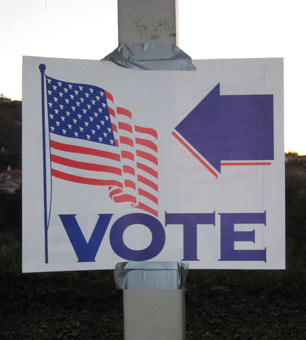Did you know that Truthout is a nonprofit and independently funded by readers like you? If you value what we do, please support our work with a donation.
What is now more clear than ever is that building a progressive political force is a 24/7/365 effort. It’s not just work to be done during election cycles, and not just done in presidential and congressional elections.
Tuesday morning at the Take Back the American Dream conference included major sessions on how to build a lasting progressive power base, from the ground up.
“I think we increase our chances of winning when we have an infrastructure that has been laid down” based on progressive issue stands over a long period of time, in which deep relationships have been developed, said Bob Master, legislative and political director for the Communications Workers of America in New York, at a “99 Elect: Dream Candidates in 2012” strategy session.
One way to do it is to have more progressive people actually running for state and local offices. That’s why Progressive Majority distributed cards that said, “Progressive Majority wants you to run for office!” (You can take up the challenge at RunForAmerica.org.)
“Most national candidates started at the state or local level,” said Gloria Totten, Progressive Majority’s director. “It is literally the system though which people come to Washington.”
The long-term goal is to have a Congress and state legislatures that represent the 99 percent because their members are from the 99 percent, representing the diversities of profession, race, gender and class in a way that actually reflects America, Totten said.
That effort is being coupled with stepped-up efforts to make sure that progressive candidates have adequate support once they make the decision to run — not just financial support, but logistical support as well.
Adam Green, director of the Progressive Change Campaign Committee, said that some promising progressive candidates have lost races they could have won because they were not equipped to make sound decisions about choosing a campaign manager or advertising consultant. So Green said his organization is moving beyond raising money for candidates and is helping candidates spend that money wisely.
Groups such as the PCCC are devoting more attention to helping candidates hone a more progressive message during campaigns, then holding candidates responsible for turning that message into progressive political action after they are elected. They are doing so in an environment in which conservatives, armed with the unlimited corporate money unleashed by the Citizens United ruling, are running increasingly disingenuous campaigns.
“A challenge that we’ve consistently had is that the progressive message is the winning message” but “as our progressive candidate takes bold positions, conservative candidates start imitating our messaging and have the money behind it,” Green said. “I would identify this faker phenomenon as the biggest challenge we have in this election.”
This year there are 6,115 state legislative seats up for grabs in 46 states, according to Progressive Majority. That group and other progressive electoral organizations are paying particular attention to Colorado, Florida, Michigan, Maine, Minnesota, Montana, Nevada, New Mexico, North Carolina, Ohio, Pennsylvania, Virginia and Wisconsin.
More than 200 progressive candidates have already been recruited to run in these races, and the goal is to have thousands recruited over the next few weeks.
In addition to state-level races, more than 50 progressive candidates have run for Congress with the support of at least some members of the Progressive Congress Table, a coalition of 11 labor and progressive grassroots organizations that meets monthly to discuss how to expand progressive representation in Congress.
These candidates have filled out a 99Elect questionnaire, and their responses can be found on the 99Elect website. The goal is to have as many candidates as possible fill out the questionnaire, which contains questions about the candidate’s stands on such issues as holding Wall Street accountable, public investment to create jobs, protecting Social Security and Medicare, and tax fairness.
At a plenary session early Tuesday, two members of Congress emphasized that this type of bottom-up, continuous political engagement was necessary to win in 2012 and beyond.
Sen. Sherrod Brown, D-Ohio, explained that he is in a tough re-election battle fueled by $8.5 million in right-wing corporate cash, being spent at a rate in excess of $500,000 a week. “It gives a whole new meaning to the phrase ‘Buy America,'” he said.
That’s why, he said, progressive people power is essential in this election to overcome the flood of money the right is pouring into the election.
Rep. Keith Ellison, D-Minn., said that on the one hand reports that the left is discouraged are misleading. There was incredible energy around the “resolutions week” devoted to getting local governments to pass resolutions condemning Citizens United. But he criticized some progressives who say they feel demoralized and unmotivated because of some actions President Obama has taken since he’s been in office.
“Martin Luther King never called Lyndon Johnson and said, ‘You’re not inspiring me. You’re not making me feel it,'” Ellison said.
That’s because the civil rights movement that surrounded King was ultimately motivated by values, not by a political personality. Progressives must see themselves the same way, driven by shared values, not a charismatic leader. “The movement always drives the leader,” he said.
Press freedom is under attack
As Trump cracks down on political speech, independent media is increasingly necessary.
Truthout produces reporting you won’t see in the mainstream: journalism from the frontlines of global conflict, interviews with grassroots movement leaders, high-quality legal analysis and more.
Our work is possible thanks to reader support. Help Truthout catalyze change and social justice — make a tax-deductible monthly or one-time donation today.
